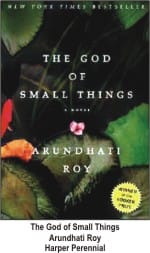A sad book, with sadness lingering

The God of Small Things is a politically charged semi-autobiographical novel by Arundhati Roy. It is a story about the childhood experiences of a pair of fraternal twins who become victims of circumstances. The book is a description of how the small things in life build up, translate into people's behaviour and affect their lives. The book was published in 1997 and won the Booker Prize in the same year as well. The rights to her book were sold in 21 countries.
The daughter of a Christian woman in Kerala and a Bengali Hindu tea planter, Suzanna Arundhati Roy was born on the 24 November 1961. Her parents were divorced when she was a child. Subsequently she lived with her mother and at the age of 16 she went for her studies to the Delhi School of Architecture.
Arundhati grew up in circumstances similar to those of the children in the book. She spent her childhood in Ayemenem, now part of Kottayam in the south Indian state of Kerala. The story primarily takes place in this town. A lot of the atmosphere of her book is based on her own experience of what it was like to grow up in Kerala. Most interestingly, it is a unique place where the world's great religions coincide. There are Christianity, Hinduism and Islam along with a strong footing of Marxism. The diverse communities live together and rub each other down as well. She grew up at a time when Marxism had enormous influence. So being raised in such a multi-cultural milieu, Arundhati became very much aware of these different cultures. Thus, later while she wrote this book there couldn't be a better location to do it than the place she grew up in.
The settings and landscapes of Aymenem can easily be compared to Bronte's Wuthering Heights and give it character. It is very much visible in the book that the kind of landscape the writer grew up in is still very much living in her --- the way she loves a tree or a river or the color of the earth. It is a different kind of love.
The story is narrated by seven-year-old Rahel, the fraternal twin sister of Esthappen (Estha), who moves crabwise, backwards and forwards. Rahel, Estha and their divorced mother Ammu, live in Aymenem. Ammu, a Syrian Christian, has had no choice but to return to her parental home after she was divorced from her husband who was a Bengali Hindu man, the father (Baba) of Estha and Rahel. Ammu and, therefore, the children seem to live on sufferance in the Aymenem house with their grandmother (Shoshamma Ipe or Mamachi), uncle (Chako) and grand aunt (Navomi Ipe or Baby Kochamma). The family owns a pickle factory that comes into conflict with the communists.
The story centres on events surrounding the visit and drowning death of the twins' half English cousin, a nine-year-old girl named Sophie Mol. The drowning death of Sophie Mol gets drowned in the forbidden sea of secrets which expose the secret love affair of Ammu with Velutha, the family's carpenter and member of the Untouchable caste.
The story is a flashback and moves from present-day India to the fateful drowning that took place twenty-three years earlier in 1969. The consequences of these intertwined events --- the drowning and the forbidden love affair --- are dreadful. The children learn that things can change in a day and that life can sometimes take an ugly twist. A few dozen hours can affect the outcome of a whole lifetime. Estha predicted it took only Chako's English wife, Margaret Kochamma and his daughter Sophie Mol to arrive on a Christmas visit to Aymenem for the tragedy to unfold. Estha also goes through a terrible experience with the Orangedrink-lemindrink Man that no child should ever experience. Estha at some point thereafter stops speaking, Ammu is banished from her home, dying miserably alone at the age of 31; Rahel is expelled from school, drifts, marries an American, whom she later leaves. The narrative begins and ends as Rahel returns to her family home in India and to Estha, where there is some hope that their love for each other and memories of the past will heal their deep wounds. Reliving a past that had separated them and split a family terminally apart. A past where their mother, Ammu, had loved an Untouchable, an affair they paid dearly for. Estha and Rahel return to the present to a "hideous grief", to be haunted by death; like their mother they break "the love laws. That laid down who should be loved. And how much".
The story portrays Estha and Rahel caught in the entanglements of adult corruption, punished for the sins of a world out of their control. The events that lead to this tragic end, where one mistake can spiral out of control and can implicate the most innocent. The two children are struggling to secure a safe environment, the unconditional love of a parent and the promise of a livable future. Nevertheless, their struggle to safeguard themselves and the childhood ends one day, a day after which futures are abandoned and recovery is unthinkable.
The God of Small Things is a naked projection of forbidden affections of children abused and criminalised and of families ruptured. The novel presides over all of these, unable or unwilling to stop the suffering, offering no salvation even to the most innocent. A god as weakened and as burdened with the load of tragedy as its victims. Great loss is not marked by ceremony. It is hardly even recognised. A loss is simply a loss, suffering is simply suffering. What occurs is an intensely personal loss which in turns becomes a loss of person, where lives continue but living ends.
The novel is rich with Indian family relationships, social customs and mores, politics and the most universal of human emotions and behaviour. Through the narrator we are confronted with a very conservative society where no one is allowed to break the rules or cross the frontier of long established things. At the same time it is a suspenseful and tragic mystery, a love story and an exposition of the paradoxes that exist in an ancient land whose history was forever altered by its British colonisers.
The God of Small Things is a very sad book and somehow the sadness stays……

 For all latest news, follow The Daily Star's Google News channel.
For all latest news, follow The Daily Star's Google News channel. 



Comments